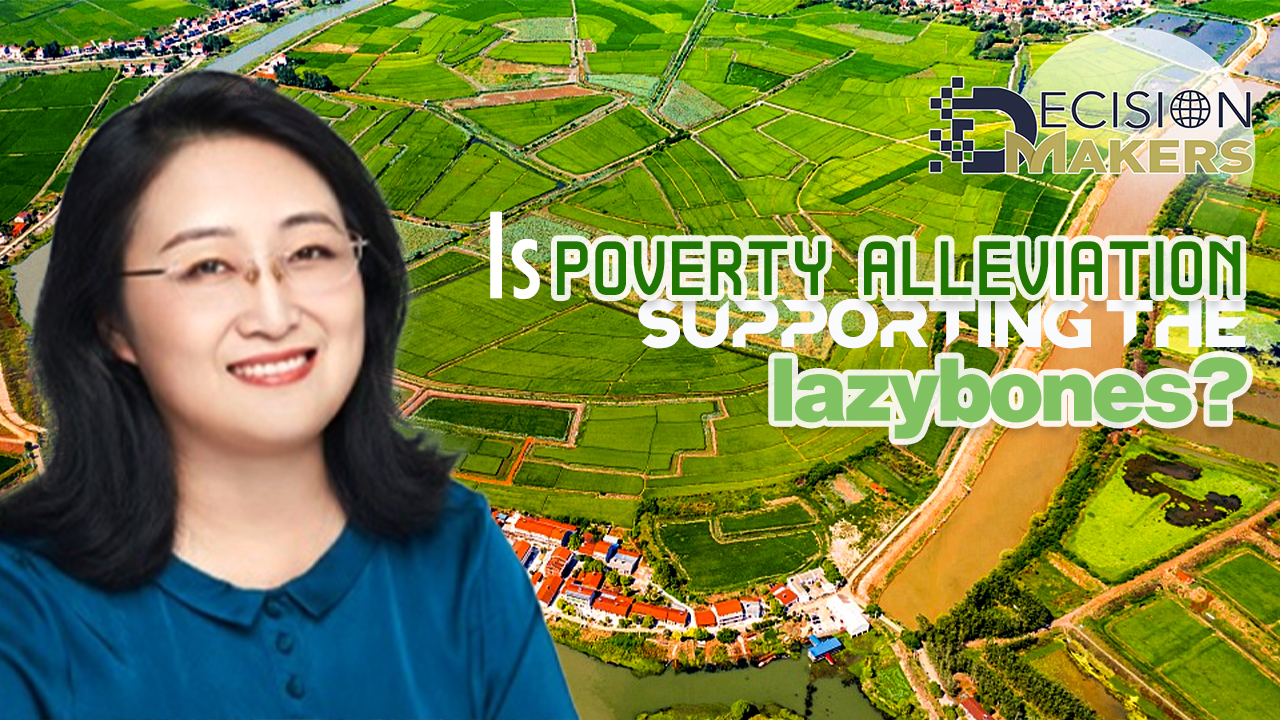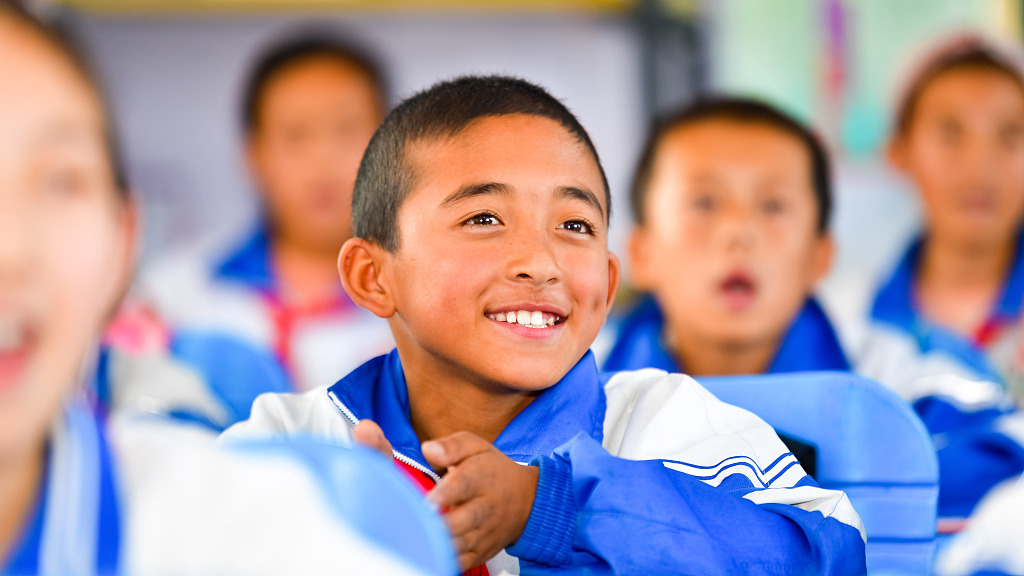
Editor's note: Decision Makers is a global platform for decision makers to share their insights on events shaping today's world. Li Xin is the deputy director-general of the International Poverty Reduction Center in China. The article reflects the author's opinions and not necessarily the views of CGTN.
There is a widely held view in the West, especially in the United States, that people are poor because they are lazy. Is this a fact? I once hosted a group of American college students visiting China. These young Americans came from an Ivy League school. They participated in the visiting program to increase their life experience. After I introduced the history and experience of China's poverty alleviation, the usual Q&A session took place.
They were very enthusiastic in raising questions and I noticed that they were thinking deep about the different policy measures in the two countries. What impressed me the most was the question they asked: "Your government has allocated so much fiscal budget to help the poor who are usually the lazy people at the bottom, do your taxpayers agree?"
Recently, some colleagues from other departments also asked me whether the conditional cash transfer in the poverty alleviation policy to some extent contributed to the inertia of some lazy people. Both of these two questions reflect a social issue.
What is reflected in the question of American college student is the phenomenon of welfare dependence studied in academic circles, which is an issue of global concern. In the United States, welfare dependence refers to a situation where the proportion of income from welfare programs in household income, or the welfare replacement rate, exceeds 50 percent. In Europe, when the welfare replacement rate exceeds 80 percent, the beneficiary's labor supply is greatly reduced.
In China's targeted poverty alleviation, the average welfare replacement rate of the beneficiaries is 13 percent. The transfer payments to registered poor population are divided as cash transfer and in-kind transfer payments, which are basically focused on production, such as distribution of production materials, such as livestock and fodder, subsidies for construction of pigpens and bullpens, education, medical subsidies, etc.
In 2015, Martin Ravallion and Chen Shaohua of the World Bank conducted a study on unconditional cash transfer payments in China and found that the project had no significant impact on labor supply. Abhijit Banerjee et al. also conducted a similar study in 2017 and found that the conclusions of the research on the impact of transfer payment welfare policies on labor supply were consistent with Martin and Chen.

Over the past seven decades, China has lifted around 850 million people out of poverty, contributing over 70 percent to the global poverty alleviation. /VCG
Over the past seven decades, China has lifted around 850 million people out of poverty, contributing over 70 percent to the global poverty alleviation. /VCG
Empirical research findings indicate that targeted poverty alleviation in China did not lead to "raising lazy people." On the contrary, a large number of practical transfer payments for targeted poverty alleviation in China, such as providing piglets and cattle to poor households, increased labor supply of the poor and helped them achieve the goal of targeted poverty alleviation through livestock raising.
Experts who study poverty all agree that poverty and inequality are closely related, and people with different political orientations are very consistent in dealing with inequality. Inequality not only directly hurts the poor, but also causes social problems for the rich, such as kidnapping and murder. More importantly, the social rift caused by inequality brings permanent harm to everyone in the society. The proportion of people who have committed retaliatory damage to society for no reason from the bottom of the population is much higher than those from the middle and higher classes.
The reason why inequality affects a person's choice is because under unequal conditions, the dominant and wealthy groups systematically monopolize opportunities, resulting in systematic exclusion of opportunities for the poor. Once a person falls into poverty trap, it becomes almost impossible to come out. Long-term degeneration and backwardness gradually becomes a lifestyle, which in turn exacerbates degradation and backwardness.
The real poverty alleviation is about breaking this cycle. Anyone who faces risks will choose the path they are familiar with to avoid risks. The biggest problem in the life of the poor is the daily difficulties and crises. Their behavior is mainly driven by more urgent and important motivations. They will take their best and minimum resources at hand to respond to crises.
Nobel Prize laureates in economics, Abhijit Banerjee and Esther Duflo, believe that the first choice for the poor is to make their lives more interesting. The poor are more inclined to buy cigarettes and alcohol when they have money, rather than invest in human capital. The poor often spend money where it shouldn't be spent, which is a typical case of irrational consumption from an economic point of view.

Over 10 million people were lifted out of poverty on an annual basis for seven consecutive years since 2012 in China. /VCG
Over 10 million people were lifted out of poverty on an annual basis for seven consecutive years since 2012 in China. /VCG
The poor may not be unaware of the importance of "long-term investment," but they "cannot wait" for the return on long-term investment. Therefore, in the eyes of the rich, the poor are often short-sighted, too lazy to change, and therefore poor. In fact, poverty is a typical path of dependence. Poverty damages one's health, self-confidence, self-esteem and sense of judgement, which in turn exacerbate poverty.
If poverty is an economic phenomenon, then poverty alleviation has distinct political attributes. Deng Xiaoping said, "Poverty is not socialism, and socialism must eliminate poverty." Chinese President Xi Jinping emphasized that "eliminating poverty is the common goal of mankind." Anti-poverty is the universal value of all mankind. Only by overcoming poverty can inequality be reduced and social harmony and human development achieved.
Poverty and anti-poverty is not only a major research topic, but also a practical question about human nature and a test of the governance system. Whether the system is good, the most important criterion according to my view is whether the people under the system live with dignity, and poverty always deprives people of their most basic needs.
The government's poverty alleviation policy is about providing a different way of life and improving livelihood to the poor for support, giving them more opportunities and financial aid, guaranteeing their health, education and housing, and helping them out of the poverty trap. In summary, poverty alleviation is completely justified, and it is by no means raising the lazybones.
(If you want to contribute and have specific expertise, please contact us at opinions@cgtn.com.)

